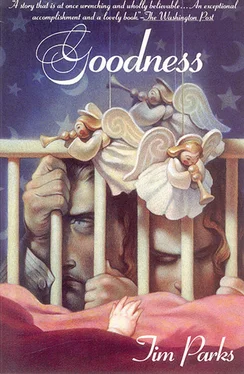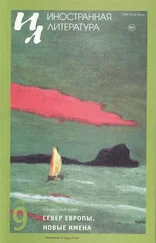They locked it. But why didn’t they unlock it? For Christ’s sake. Can they still be in there? Surely not. The roar of the fire in Hilary’s room is ear-splitting. Why why why didn’t they unlock that door? This is mad.
My mother stirs and groans. I can’t see her face which is squashed against the angle of door and carpet. Hilary likewise is merely a mound in the swirling dark.
Has it been thirty seconds, forty, fifty, since I took this breath?
In the space of a breath, a single breath, I must decide who I am.
I look about me from stinging, streaming eyes. My generous mother. My hopeless, helpless child. My expensive, graceful, gorgeous house, burning. This is the moment of truth I have so expensively engineered. I look, but there is no revelation, no dream mirror to show me whatever my face may be, nor through the suffocating smoke do I miraculously see any missing part of me to be rushed off to that improbable surgeon. There is no help. Only unthinking, with savage violence, I begin to do my instinctive duty by these others.
Indeed my fury and aggression are their only hope now. For I cannot drag them both back through the bonfire at the top of the stairs. I know that. One perhaps, but not both. And though again I know that this is precisely the kind of situation I strove to bring about, nevertheless the simple solution of leaving that blurred bundle behind, is, for reasons beyond reason, immediately discounted now. I turn to the door, step over my mother and with the last of this interminable breath give the jerking kick I learnt long ago at karate.
The wood shudders but does not give.
Why shouldn’t I just pull my mother free, back along the passage through the flames, assuming it can be done? Why am I forever thinking one thing and doing another?
I’m shaking. To regain control I begin to breathe out, slowly, slowly, from squeezed and painful lungs. And kick again. This time I yell fiercely, expelling the last of that breath in an explosion of violence, springing the kick right by the lock.
Nothing.
So now I have to, have to, take this next breath, the beginning of the rest of my life. Which may be very brief. My lungs are crushed, skewered. My vision falters. In a frenzy of frustration, I take a few paces back to where the flames are darting in glowing beads across the carpeting and, head down, I simply charge the door with my thick stubborn skull. In a shock of pain, it gives.
I grab my mother. Heaving her dead weight across the room to the window, already flung open, I register that Peggy and Gregory are not here. Insanely they have fled through the window. Did they think somebody was trying to discover them? The roof of the side porch is only five or so feet below. I could lower mother down first, then follow her myself. Mission accomplished.
For a moment I pause. Leaning over the sill, I gasp the sweet air, taking in the dark garden scene, the crowd, the shouts, the halo of a tree in blossom, the silhouette of other chimneyed houses stretching away downhill under a yellow city glow, the sudden wail of sirens. Then, against my better judgement perhaps, like my mother so many years ago when she renounced her faith for me, I go back in there and lift that small soul clear.
It’s evening. I’ve been relaxing outside by the goldfish pond in the patio of our Maida Vale house. I’ve been taking it rather easy of late is the truth. I can’t be bothered to bring work home any more. There does come a time when one realises that such things are not so important. Though it would be silly to say I should have seen this before. I’m past even blaming myself. Paper on my knees, I sit here enjoying the soft light, the summer air, the gentle back and forth of the swing couch. A skyline of chimneypots and TV aerials hardens above the ivy wall. There are blue curtains in a neighbour’s bedroom and peeps of domesticity in lighted windows. I sip my gin, light a Camel. Sometimes I wonder if I haven’t just discovered how to enjoy life. You know? I work hard enough, my programs are better than ever, when I come home I do my bit with dear Hilary, we chuckle together if she’s in form, then in the evening I step out here to watch the coal of my cigarette brightening as the twilight bleeds away. Next week we’re going to do a family holiday in south-west France.
The article I’m reading on the health service doesn’t interest me. It’s too strident. The guy must have some kind of problem. My eye strays, follows the cool darting goldfish between their lily leaves, the slow stream of planes that wink over west London in the dusk. I like Maida Vale. I like a way the sparrows have of scuffling in the ivy. A march of ants across the paving. And then I must have fallen asleep, since I wake now with a start and a shiver to find it’s past midnight. For God’s sake, I’m freezing. But deeply contented somehow. A man falling asleep on his patio; that’s some achievement.
I clear up my empty glass, a bowl of peanuts, lock the doors and climb upstairs to bed. Shirley isn’t there yet. She is tending Hilary through the nth tonsilitis. There are cooing noises from down the passage. I undress, lie down and have just switched out the light when I hear her feet padding to the bathroom. A few minutes later she treads quietly into the room and slips in between the sheets.
‘Got her off?’
‘Oh, are you still awake? Yes,’ she says. ‘Yes, I have.’
We lie on our backs saying nothing in the staring dark. A lorry passes on Elgin Avenue. ‘Go to sleep,’ I tell her, ‘I’ll get up if she cries. It’s my turn.’ Because we’ve worked out a fairly reasonable routine with these things now. But Shirley replies: ‘She won’t cry, George.’
There’s something unusual in her voice, and she doesn’t often use my name like that. After another moment lying still, I prop myself up on an elbow, and stare into her shadowy face. Her eyes are wide open.
‘I just gave her all the medicine in the cupboard.’
She begins to explain that she couldn’t help it. She started spooning in the medicine — the girl was suffering — and then felt she couldn’t stop. She felt somehow the child was urging her to do it.
‘It was as if I heard her voice. As if she’d been speaking to me for years. You know? I knew the voice so well. It was her. And she was saying, do it, do it now.’
Shirley is pleading, as I might have done a year or so ago in similar circumstances. She speaks softly and persuasively. But she is telling me what she knows can’t be true. And she knows I know. She has said it so many times herself: how can a child who doesn’t know what death is, nor that medicine might bring it about, urge you to make this gesture? But I remember my own experience, spooning in sweet syrup; that peculiar sense of rightness, the nearness of release.
‘Everything,’ she says, ‘the whole caboodle. I’ve been at it half an hour. You know how long it takes to get her to swallow things.’ With a simple laugh she adds: ‘For what it’s worth, I was praying as I did it.’
It had sounded more like a love coo to me.
We lie in silence. The well-furnished hush of the room, the London night. Until at last I whisper: ‘Shirley,’ and for some reason begin to repeat in the dark, ‘Shirley, Shirley, Shirley, Shirley.’ She says, ‘George, George,’ and we embrace.












